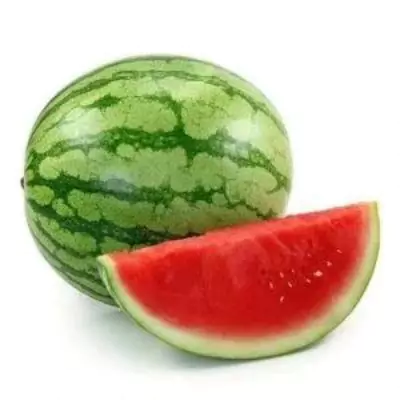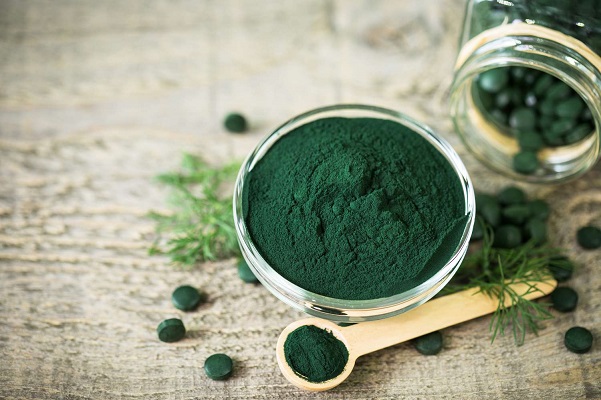On This Page
Overview
The summer fruit watermelon has 92% water, as the name suggests. Citrullus lanatus is the fruit’s scientific name. In a tropical nation like India, the summertime heat can occasionally become intolerable in most states. Everyone adores them because of their great nutritious content. It can be ranked second only to mangoes in India and one of the best superfoods. This delicious fruit goodness is not only mouthwatering and aesthetically pleasing, but it is also incredibly nutritious. Additionally, it can aid in weight loss and reduce your chance of getting heart disease and asthma attacks.
Synonyms of Watermelon
- Citrullus lanatus
- Tarbuj
- kalinda
Nutritional Facts of Watermelon
One-cup of watermelon includes:-
| Calories: | 46 |
| Carbohydrates: | 11.6 grams |
| Fat: | 0.2 grams |
| Sugar: | 9.5 grams |
| Fiber: | 0.6 gram |
| Protein: | 0.9 gram |
Phytochemical Constituents of Watermelon
- Lycopene
- Vitamin C
- β-carotene
Therapeutic Uses of Watermelon
- Good vision
This fruit has a good amount of beta-carotene, which gives them its deep red color and is converted by the body into vitamin A. The formation of pigments within the retina is vital, and vitamin A also guards against age-related macular degeneration and night blindness.
- Lowers inflammation
Consuming watermelon also has the added health benefit of reducing inflammation. Lycopene and significant antioxidants like Vitamin C, which reduce oxidative stress and inflammation, are present in it. Since oxidative stress can cause a variety of chronic disorders, it is crucial to reduce it.
- Fat loss
Citrulline, an important amino acid found in watermelon, has been demonstrated to significantly reduce the buildup of fat in our cells. This amino acid prevents the body from producing fat by going through several stages. In turn, this prevents the body from storing too much fat.
- Healthful digestion
Watermelon can be ingested for healthy digestion because it contains some fiber and a lot of water. Consuming this watery fruit regularly can help your digestion. Another reason to consume watermelon in the summer is that fiber-rich foods aid in digestion.
- Supplies quick hydration
Since watermelon contains about 92% water, its effectiveness in hydrating humans is apparent.
The name of it is water! It contains beneficial electrolytes like magnesium and potassium that assist in rapidly replenishing energy levels. Additionally, this trait guards against heat exhaustion. An amazing diuretic allows you to produce more urine without putting too much strain on your kidneys.
Home Remedies Watermelon
- Glowing Skin
You may get soft, supple skin with watermelon just by mixing yogurt with watermelon juice. This face mask will help your skin soft and younger and healthier if you apply it frequently. simply add half a cup of watermelon juice to a small bowl. Add a tablespoon of yogurt, then thoroughly combine the two ingredients. Apply it to your face and then Leave it on for 10 to 15 minutes then wash it with cold water.
- Control blood pressure
Citrulline, which has anti-hypertensive properties, is included in the seeds. Nitric oxide production, which aids in regulating blood pressure, is increased while aortic pressure is decreased.
- Lose weight
The watermelon peel’s high fiber content makes it an ideal supplement for weight loss. To help you achieve your weight loss goal, the white component, which is typically discarded, can be incorporated into salads and curries.

Have A Health Issue?
Consult Online
- Dr. Sahil Gupta (B.A.M.S., M.H.A.)
Ayurvedic Allergy Specialist
CEO & Founder of IAFA®
Ayurvedic Aspects of Watermelon
Watermelon has a cooling (Sheetal) and moisturizing effect on the body, according to Ayurveda. It helps with excessive thirst, weariness, burning feeling reduction, edema reduction, and bladder infections, and it also functions as a diuretic. It can impede digestion and result in Ama (digestive toxins).
Daily Dose: One cup of watermelon every day is plenty
Side Effects of Watermelon
- Digestive Problems
Both water and dietary fiber are abundant in watermelon. Consuming excessive amounts, however, may result in digestive issues like bloating, flatulence, diarrhea and gas.
- Liver inflammation
Regular alcohol drinkers should not consume a lot of watermelon since the fruit’s high lycopene content could react with alcohol and irritate the liver. Additionally, the liver may suffer injury from severe oxidative stress.
- Loose Stools
Sorbitol is a unique kind of sugar found in watermelon. Those who are sorbitol intolerant experience loose stools and flatulence after eating watermelon.
- Cardiovascular Problems
Potassium is an essential component that plays many roles in maintaining the body’s health, and watermelon is well known for being an excellent supply of this mineral. However, consuming too much potassium might result in heart issues like irregular heartbeat, a weak pulse rate, etc.
Conclusion
Watermelons are a fantastic food for overall health because they are loaded with minerals and antioxidants. And unlike many other wholesome fruits and vegetables, it tastes good and is well-liked by all. It is the ideal fruit for summer because it combats the heat and exhaustion that go along with it. To get all of this goodness’ wonderful advantages, you must incorporate it into your diet. But alongwith its many benefits it has some disadvantages too so be cautious before consuming it in high quantities as it results in loose stools, bloating and in some people, it can also cause allergic reactions. If you encounter any negative effects after excessive consumption of watermelon you can get herbal and 100% natural treatment only from Dr. Gupta at IAFA where he uses herbs and other natural medication to treat allergies and any disease so schedule your appointment with Dr. Gupta to get an effective, natural treatment of your diseases.
References
- https://www.webmd.com/diet/health-benefits-watercress
- Amiri H 2012 Volatile constituents and antioxidant activity of flowers, stems and leaves of Nasturtium officinale R. Br Natural product Research 2 109-115
- https://iopscience.iop.org/article/10.1088/1755-1315/761/1/012042









